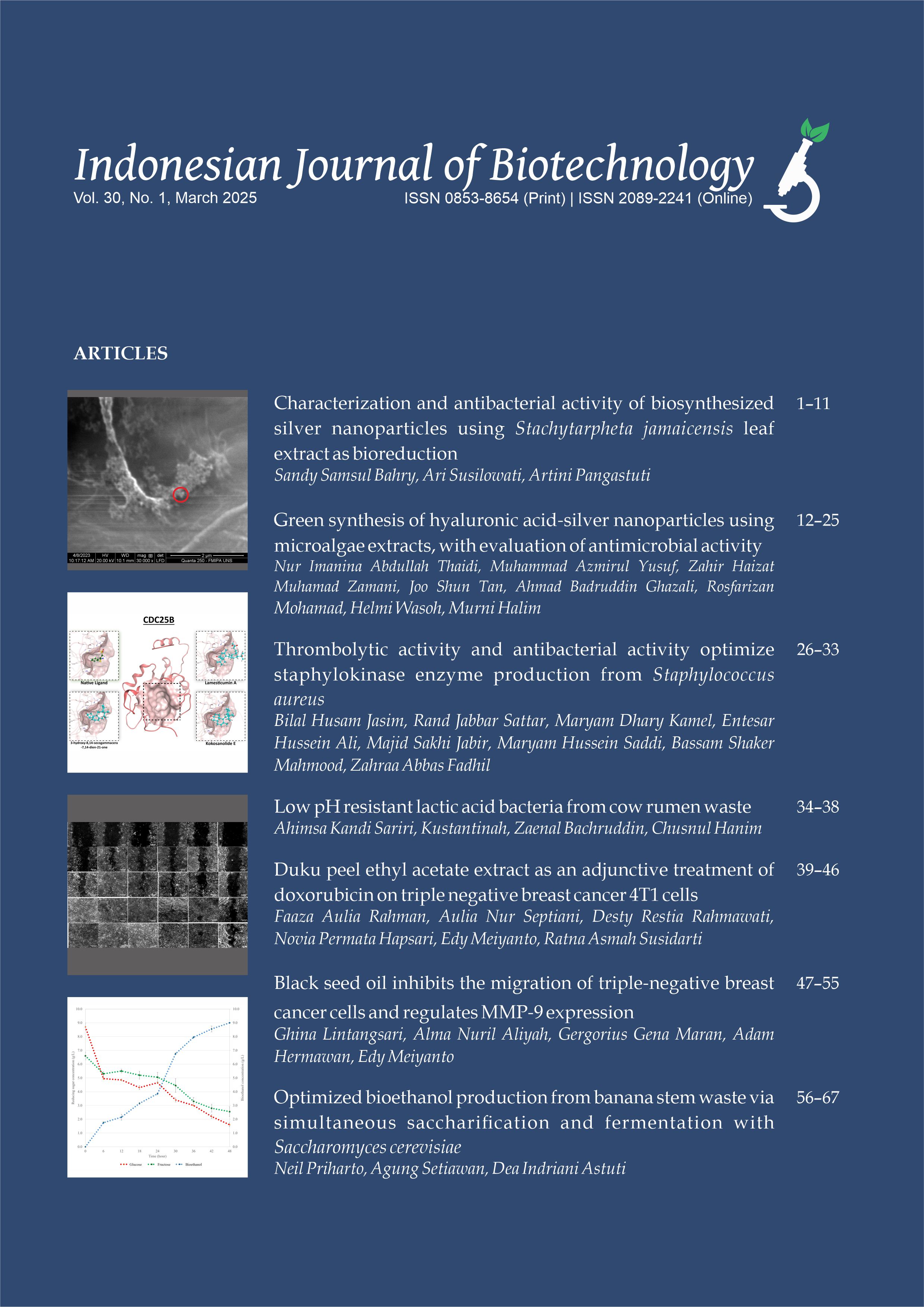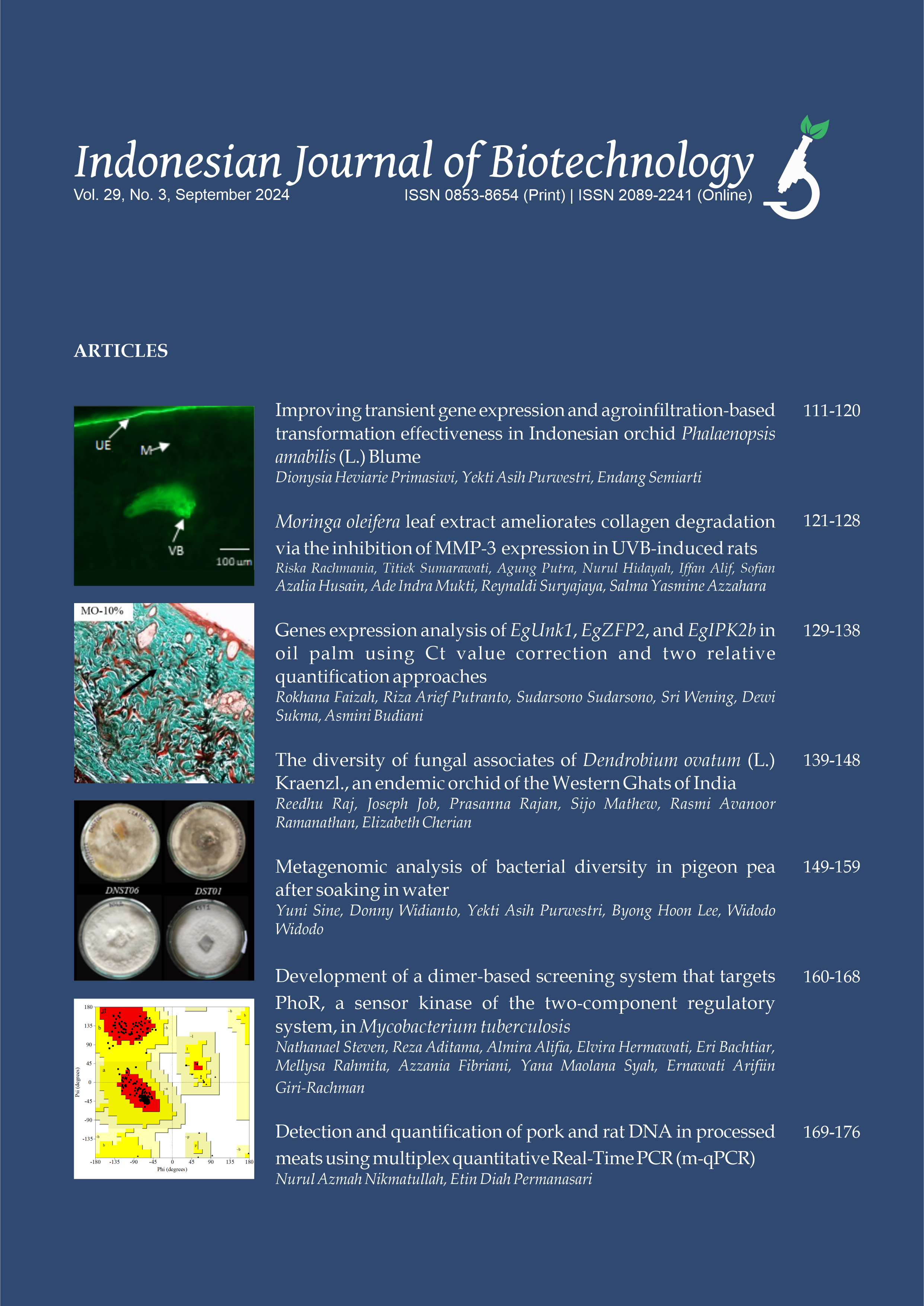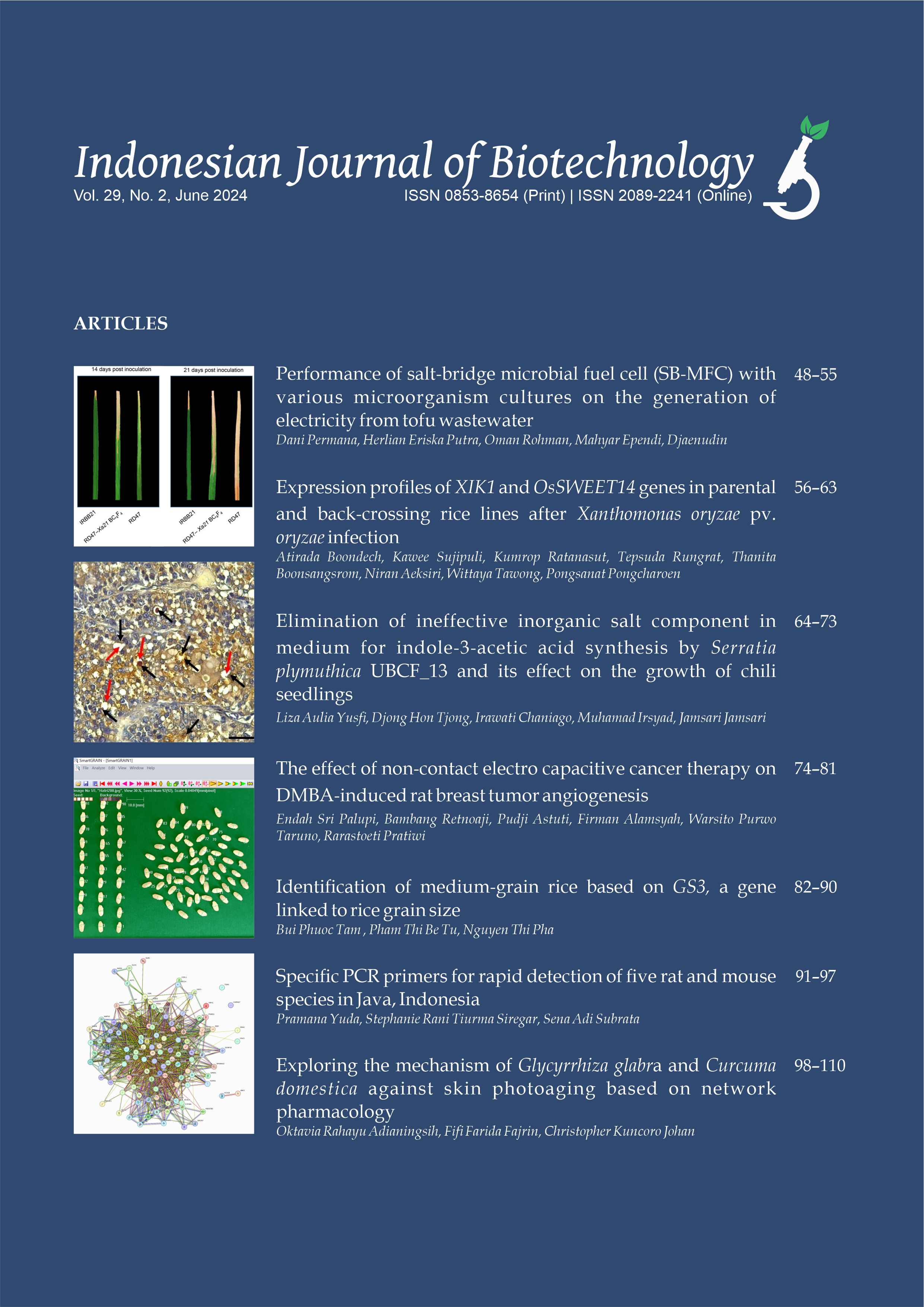Characterization of the urogenital microbiome in patients with urinary tract infections
Fitri Nadifah(1*), Wayan Tunas Artama(2), Budi Setiadi Daryono(3), Endah Retnaningrum(4)
(1) Program of Doctoral, Faculty of Biology, Universitas Gadjah Mada. Jl. Teknika Selatan, Yogyakarta 55281, Indonesia
(2) Department of Biochemistry, Faculty of Veterinary Medicine, Universitas Gadjah Mada. Jl. Fauna No.2 Karangmalang, Yogyakarta 55281, Indonesia
(3) Laboratory of Genetics, Faculty of Biology, Universitas Gadjah Mada. Jl. Teknika Selatan, Yogyakarta 55281, Indonesia
(4) Laboratory of Microbiology, Faculty of Biology, Universitas Gadjah Mada. Jl. Teknika Selatan, Yogyakarta 55281, Indonesia
(*) Corresponding Author
Abstract
Keywords
Full Text:
PDFReferences
Alauzet C, Lozniewski A, Marchandin H. 2019. Metronidazole resistance and nim genes in anaerobes: A review. Anaerobe 55:40–53. doi:10.1016/j.anaerobe.2018.10.004.
Anggi A, Wijaya DW, Ramayani OR. 2019. Risk factors for catheterassociated urinary tract infection and uropathogen bacterial profile in the intensive care unit in hospitals in Medan, Indonesia. Maced. J. Med. Sci. 7(20):3488–3492. doi:10.3889/oamjms.2019.684.
Bajic P, Van Kuiken ME, Burge BK, Kirshenbaum EJ, Joyce CJ, Wolfe AJ, Branch JD, Bresler L, Farooq AV. 2018. Male bladder microbiome relates to lower urinary tract symptoms. Eur. Urol. Focus 6(2):1–7. doi:10.1016/j.euf.2018.08.001.
Bi H, Tian Y, Song C, Li J, Liu T, Chen Z, Chen C, Huang Y, Zhang Y. 2019. Urinary microbiota A potential biomarker and therapeutic target for bladder cancer. J. Med. Microbiol. 68(10):1471–1478. doi:10.1099/jmm.0.001058.
Brannon JR, Dunigan TL, Beebout CJ, Ross T, Wiebe MA, Reynolds WS, Hadjifrangiskou M. 2020. Invasion of vaginal epithelial cells by uropathogenic Escherichia coli. Nat. Commun. 11(1):1–11. doi:10.1038/s41467020166275.
Brubaker L, Wolfe AJ. 2017. The female urinary microbiota, urinary health and common urinary disorders. Ann. Transl. Med. 5(2):34. doi:10.21037/atm.2016.11.62.
Bučević Popović V, Šitum M, Chow CET, Chan LS, Roje B, Terzić J. 2018. The urinary microbiome as sociated with bladder cancer. Sci. Rep. 8(1):1–8. doi:10.1038/s4159801829054w.
Caporaso JG, Kuczynski J, Stombaugh J, Bittinger K, Bushman FD, Costello EK, Fierer N, Peña AG, Goodrich JK, Gordon JI, Huttley GA, Kelley ST, Knights D, Koenig JE, Ley RE, Lozupone CA, Mcdonald D, Muegge BD, Pirrung M, Reeder J, Sevinsky JR, Turnbaugh PJ, Walters WA, Widmann J, Yatsunenko T, Zaneveld J, Knight R. 2010. QIIME allows analysis of high throughput community sequencing data Intensity normalization improves color calling in SOLiD sequencing. Nat. Publ. Gr. 466 7(5):335–336. doi:10.1038/nmeth0510335.
Castro J, Machado D, Cerca N. 2019. Unveiling the role of Gardnerella vaginalis in polymicrobial Bacterial Vaginosis biofilms: The impact of other vaginal pathogens living as neighbors. ISME J. 13(5):1306–1317. doi:10.1038/s4139601803370.
Chagneau CV, Massip C, BossuetGreif N, Fremez C, Motta JP, Shima A, Besson C, Faouder PL, Cénac N, Roth MP, Coppin H, Fontanié M, Martin P, Nougayrède JP, Oswald E. 2020. Uropathogenic E. coli induces DNA damage in the bladder. bioRxiv 17(2):1–22. doi:https://doi.org/10.1101/2020.05.07.080291.
Christine G, Budiarti S, Astuti RI. 2018. Diversity of urinary tract infection bacteria in children in Indonesia based on metagenomic approach. Biodiversitas 482 19(4):1375–1381. doi:10.13057/biodiv/d190425.
Colas L, Mongodin EF, Montassier E, Chesneau M, Guerif P, Hittle L, Giral M, Bromberg JS, Brouard S, Consortium D. 2020. Unique and specific Proteobacteria diversity in urinary microbiota of tolerant kidney transplanted recipients. Am. J. Transplant. 20(1):145–158. doi:10.1111/ajt.15549.
Deurenberg RH, Bathoorn E, Chlebowicz MA, Couto N, Ferdous M, GarcíaCobos S, KooistraSmid AM, Raangs EC, Rosema S, Veloo AC, Zhou K, Friedrich AW, Rossen JW. 2017. Application of next generation sequencing in clinical microbiology and infection prevention. J. Biotechnol. 243:16–24. doi:10.1016/j.jbiotec.2016.12.022.
Dixon M, Stefil M, McDonald M, BjerklundJohansen TE, Naber K, Wagenlehner F, Mouraviev V. 2020. Metagenomics in diagnosis and improved targeted treatment of UTI. World J. Urol. 38(1):35–43. doi:10.1007/s00345019027319.
Du M, Song L, Wang Y, Suo J, Bai Y, Xing Y, Xie L, Liu B, Li L, Luo Y, Liu Y. 2021. Investigation and control of an outbreak of urinary tract infections caused by Burkholderia cepacia contaminated anesthetic gel. Antimicrob. Resist. Infect. Control 10(1):1–7. doi:10.1186/s1375602000855x.
Dune TJ, Price TK, Hilt EE, ThomasWhite KJ, Kliethermes S, Brincat C, Brubaker L, Schreckenberger P, Wolfe AJ, Mueller ER. 2017. Urinary symptoms and their associations with urinary tract infections in urogynecologic patients. Obstet. Gynecol. 130(4):718–725. doi:10.1097/AOG.0000000000002239.
Duployez C, Le Guern R, Faure E, Wallet F, Loïez C. 2020. Sneathia amnii, an unusual pathogen in spondylitis: A case report. Anaerobe 66:1–3. doi:10.1016/j.anaerobe.2020.102277.
Edgar RC. 2004. MUSCLE: Multiple sequence alignment with high accuracy and high through put. Nucleic Acids Res. 32(5):1792–1797. doi:10.1093/nar/gkh340.
Edgar RC. 2013. UPARSE: Highly accurate OTU sequences from microbial amplicon reads. Nat. Methods 10(10):996–998. doi:10.1038/nmeth.2604.
Fettweis JM, Serrano MG, Brooks JP, Edwards DJ, Girerd PH, Parikh HI, Huang B, Arodz TJ, Edupuganti L, Glascock AL, Xu J, Jimenez NR, Vivadelli SC, Fong SS, Sheth NU, Jean S, Lee V, Bokhari YA, Lara AM, Mistry SD, Duckworth RA, Bradley SP, Koparde VN, Orenda XV, Milton SH, Rozycki SK, Matveyev AV, Wright ML, Huzurbazar SV, Jackson EM, Smirnova E, Korlach J, Tsai YC, Dickinson MR, Brooks JL, Drake JI, Chaffin DO, Sexton AL, Gravett MG, Rubens CE, Wijesooriya NR, HendricksMuñoz KD, Jefferson KK, Strauss JF, Buck GA. 2019. The vaginal microbiome and preterm birth. Nat. Med. 25(6):1012–1021. doi:10.1038/s4159101904502.
Fok CS, Gao X, Huaiying L, ThomasWhite KJ, Mueller ER, Wolfe AJ, Dong Q, Brubaker L. 2019. Urinary symptoms are associated with certain urinary microbes in urogynecology surgical patients. Physiol. Behav. 176(3):139–148. doi:10.1007/s0019201837321.Urinary.
FrimodtMøller N. 2019. The urine microbiome – Contamination or a novel paradigm? EBioMedicine 44:20–21. doi:10.1016/j.ebiom.2019.05.016.
Gentile GL, Rupert AS, Carrasco LI, Garcia EM, Kumar NG, Walsh SW, Jefferson KK. 2020. Identification of a cytopathogenic toxin from Sneathia amnii. J. Bacteriol. 202(13):1–11. doi:10.1128/JB.0016220.
González MJ, Da Cunda P, Notejane M, Zunino P, Scavone P, Robino L. 2019. Fosfomycin tromethamine activity on biofilm and intracellular bacterial communities produced by uropathogenic Escherichia coli isolated from patients with urinary tract infection. Pathog. Dis. 77(3):1–7. doi:10.1093/femspd/ftz022.
Greenbaum S, Greenbaum G, MoranGilad J, Weintruab AY. 2019. Ecological dynamics of the vaginal microbiome in relation to health and disease. Am. J. Obstet. Gynecol. 220(4):324–335. doi:10.1016/j.ajog.2018.11.1089.
Hiergeist A, Gessner A. 2017. Clinical implications of the microbiome in urinary tract diseases. Curr. Opin. Urol. 27(2):93–98. doi:10.1097/MOU.0000000000000367.
Hill MO. 1973. Diversity and evenness: A unifying notation and its consequences. Ecology 54(2):427–432. doi:10.2307/1934352.
Karstens L, Asquith M, Davin S, Stauffer P, Fair D, Gregory WT, Rosenbaum JT, McWeeney SK, Nar dos R. 2016. Does the urinary microbiome play a role in urgency urinary continence and its severity? Front. Cell. Infect. Microbiol. 6:1–13. doi:10.3389/fcimb.2016.00078.
Kim JM, Park YJ. 2018. Lactobacillus and urine microbiome in association with urinary tract infections and bacterial vaginosis. Urogenit. Tract Infect. 13(1):7. doi:10.14777/uti.2018.13.1.7.
Kim YS, Unno T, Kim BY, Park MS. 2020. Sex differences in gut microbiota. World J. Men’s Health 38(1):48–60. doi:10.5534/wjmh.190009.
Komesu YM, Dinwiddie DL, Richter HE, Lukacz ES, Sung VW, Siddiqui NY, Zyczynski HM, Ridgeway B, Rogers RG, Arya LA, Mazloomdoost D, Levy J, Carper B, Gantz MG, Network NPFD. 2020. Defining the relationship between vaginal and urinary microbiomes. Am. J. Obstet. Gynecol. 222(2):139–148. doi:10.1016/j.physbeh.2017.03.040.
Komesu YM, Richter HE, Carper B, Dinwiddie DL, Lukacz ES, Siddiqui NY, Sung VW, Zyczynski HM, Ridgeway B, Rogers RG, Arya LA, Mazloomdoost D, Gantz MG. 2018. The urinary microbiome in women with mixed urinary incontinence compared to similarly aged controls. Int. Urogynecol. J. 29(12):1785–1795. doi:10.1007/s0019201836836.
Kunze AN, Larsen B. 2019. Current concepts of Gardnerella vaginalis biofilm: Significance in bacterial vaginosis. Open J. Obstet. Gynecol. 09(12):1569–1585. doi:10.4236/ojog.2019.912153.
Lee KW, Song HY, Kim YH. 2020. The microbiome in urological diseases. Investig. Clin. Urol. 61(4):338-348. doi:10.4111/icu.2020.61.4.338.
Leski TA, Taitt CR, Bangura U, Stockelman MG, Ansumana R, Cooper WH, Stenger DA, Vora GJ. 2016. High prevalence of multidrug resistant Enterobacteriaceae isolated from outpatient urine samples but not the hospital environment in Bo, Sierra Leone. BMC Infect. Dis. 16(1):1–9. doi:10.1186/s1287901614951.
Liu L, Qin L, Hao S, Lan R, Xu B, Guo Y, Jiang R, Sun H, Chen X, Lv X, Xu J, Zhao C. 2020. Lineage, antimicrobial resistance and virulence of citrobacter spp. Pathogens 9(3):1–21. doi:10.3390/pathogens9030195.
MacIntyre DA, Sykes L, Bennett PR. 2017. The human female urogenital microbiome: Complexity in normality. Emerging Top. Life Sci. 1(4):363–372. doi:10.1042/ETLS20170042.
Magistro G, Stief CG. 2019. The urinary tract microbiome: The answer to all our open questions? Eur. Urol. Focus 5(1):36–38. doi:10.1016/j.euf.2018.06.011.
Magoč T, Salzberg SL. 2011. FLASH: Fast length adjustment of short reads to improve genome assemblies. Bioinformatics 27(21):2957–2963. doi:10.1093/bioinformatics/btr507.
Markowski MC, Boorjian SA, Burton JP, Hahn NM, Ingersoll MA, Vareki SM, Pal SK, Sfanos KS. 2019. The microbiome and genitourinary cancer: A collaborative review. Eur. Urol. 75(4):637–646. doi:10.1016/j.eururo.2018.12.043.
Meštrović T, Matijašić M, Perić M, Čipčić Paljetak H, Barešić A, Verbanac D. 2020. The role of gut, vaginal, and urinary microbiome in urinary tract infections: From bench to bedside. Diagnostics 11(1):7. doi:10.3390/diagnostics11010007.
Morrill S, Gilbert NM, Lewis AL. 2020. Gardnerella vaginalis as a cause of bacterial vaginosis: Appraisal of the evidence from in vivo models. Front. Cell. Infect. Microbiol. 10:1–19. doi:10.3389/fcimb.2020.00168.
Mouraviev V, McDonald M. 2018. An implementation of next generation sequencing for prevention and diagnosis of urinary tract infection in urology. Can. J. Urol. 25(3):9349–9356.
Moustafa A, Li W, Singh H, Moncera KJ, Torralba MG, Yu Y, Manuel O, Biggs W, Venter JC, Nelson KE, Pieper R, Telenti A. 2018. Microbial metagenome of urinary tract infection. Sci. Rep. 8(1):1–12. doi:10.1038/s41598018226608.
Neugent ML, Hulyalkar NV, Nguyen VH, Zimmern PE, De Nisco NJ. 2020. Advances in understanding the human urinary microbiome and its potential role in urinary tract infection. mBio 11(2):1–15. doi:10.1128/mBio.0021820.
PerezCarrasco V, SorianoLerma A, Soriano M, GutiérrezFernández J, GarciaSalcedo JA. 2021. Urinary Microbiome: Yin and Yang of the Urinary Tract. Front. Cell. Infect. Microbiol. 11:1–17. doi:10.3389/fcimb.2021.617002.
Pohl HG, Groah SL, PérezLosada M, Ljungberg I, Sprague BM, Chandal N, Caldovic L, Hsieh M. 2020. The urine microbiome of healthy men and women differs by urine collection method. Int. Neurourol. J. 24(1):41–51. doi:10.5213/inj.1938244.122.
Price TK, Hilt EE, Dune TJ, Mueller ER, Wolfe AJ, Brubaker L. 2018. Urine trouble : Should we think differently about UTI? Int Urogynecol J. 29(2):205–210. doi:10.1007/s0019201735288.
Price TK, Hilt EE, Thomaswhite K, Mueller ER, Wolfe AJ. 2019. The urobiome of continent adult women: A crosssectional study. BJOG 127(2):193–201. doi:10.1111/14710528.15920.
Qin J, Shi X, Xu J, Yuan S, Zheng B, Zhang E, Huang G, Li G, Jiang G, Gao S, Tian C, Guo R, Fu Z, Huang Q, Yang R, Zhang W, Li S, Wu S. 2021. Characterization of the genitourinary microbiome of 1,165 middle aged and elderly healthy individuals. Front. Microbiol. 12:1–14. doi:10.3389/fmicb.2021.673969.
Seo SS, Arokiyaraj S, Kim MK, Oh HY, Kwon M, Kong JS, Shin MK, Yu YL, Lee JK. 2017. High prevalence of Leptotrichia amnionii, Atopobium vaginae, Sneathia sanguinegens, and factor 1 microbes and association of spontaneous abortion among Korean women. BioMed Res. Int. 2017:1–10. doi:10.1155/2017/5435089.
Shreiner AB, Kao JY, Young VB. 2015. The gut microbiome in health and in disease. Curr. Opin. Gastroenterol. 31(1):69–75. doi:10.1097/MOG.0000000000000139.
Tayh G, Al Laham N, Ben Yahia H, Ben Sallem R, Elottol AE, Ben Slama K. 2019. ExtendedSpectrum βLactamases among Enterobacteriaceae Isolated from Urinary Tract Infections in Gaza Strip, Palestine. Biomed Res. Int. 2019:1–11. doi:10.1155/2019/4041801.
ThomasWhite K, Forster SC, Kumar N, Van Kuiken M, Putonti C, Stares MD, Hilt EE, Price TK, Wolfe AJ, Lawley TD. 2018a. Culturing of female bladder bacteria reveals an interconnected urogenital microbiota. Nat. Commun. 9(1):1–7. doi:10.1038/s41467018039685.
ThomasWhite KJ, Gao X, Lin H, Fok CS, Ghanayem K, Mueller ER, Dong Q, Brubaker L, Wolfe AJ. 2018b. Urinary microbes and postoperative urinary tract infection risk in urogynecology surgical patients. Int. Urogynecol. J. 29(12):1797–1805. doi:10.1007/s0019201837673.
Tubuh IWDA, Budayanti NNS, Fatmawati NND. 2019. Karakteristik pasien dengan infeksi Burkholderia cepacia di RSUP Sanglah pada tahun 20142016. Intisari Sains Medis 10(1):48–52. doi:10.15562/ism.v10i1.243.
Valeri F, Endres K. 2021. How biological sex of the host shapes its gut microbiota. Front. Neuroendocrinol. 61:100912. doi:10.1016/j.yfrne.2021.100912.
Veloo AC, Chlebowicz M, Winter HL, Bathoorn D, Rossen JW. 2018. Three metronidazoleresistant Prevotella bivia strains harbour a mobile element, encoding a novel nim gene, nimk, and an efflux small MDR transporter. J. Antimicrob. Chemother. 73(10):2687–2690. doi:10.1093/jac/dky236.
Wang Q, Garrity GM, Tiedje JM, Cole JR. 2007. Naïve Bayesian classifier for rapid assignment of rRNA sequences into the new bacterial taxonomy. Appl. Environ. Microbiol. 73(16):5261–5267. doi:10.1128/AEM.0006207.
Wolfe AJ, Brubaker L. 2019. Urobiome updates: advances in urinary microbiome research. Nat. Rev. Urol. 16(2):73–74. doi:10.1038/s4158501801275.
Yıldırım S, Shoskes D, Kulkarni S, Laguna P. 2020. Urinary microbiome in uncomplicated and interstitial cystitis: Is there any similarity? World J. Urol. 38(11):2721–2731. doi:10.1007/s0034502003099x.
Article Metrics
Refbacks
- There are currently no refbacks.
Copyright (c) 2022 The Author(s)

This work is licensed under a Creative Commons Attribution-ShareAlike 4.0 International License.









